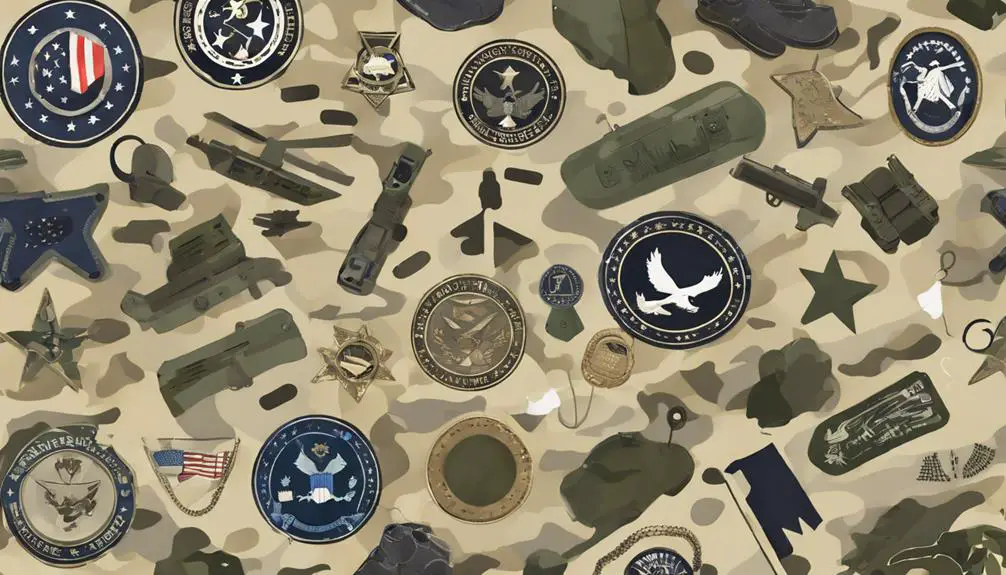You're about to explore the vast landscape of military slang, where acronyms and jargon reign supreme. From its roots in World War I to its modern-day use on social media, military slang has evolved to facilitate efficient communication. Each branch has its unique slang, reflecting its culture and history. You'll encounter terms like 'fobbit,' 'OSOK,' and 'SITREP' that convey emotions, actions, and experiences. As you venture deeper, you'll discover how humor and banter help soldiers cope with stress, and how military slang bridges the communication gap between the military and civilians. The code names, nicknames, and myths await you – and there's much more to uncover.
The Roots of Military Slang
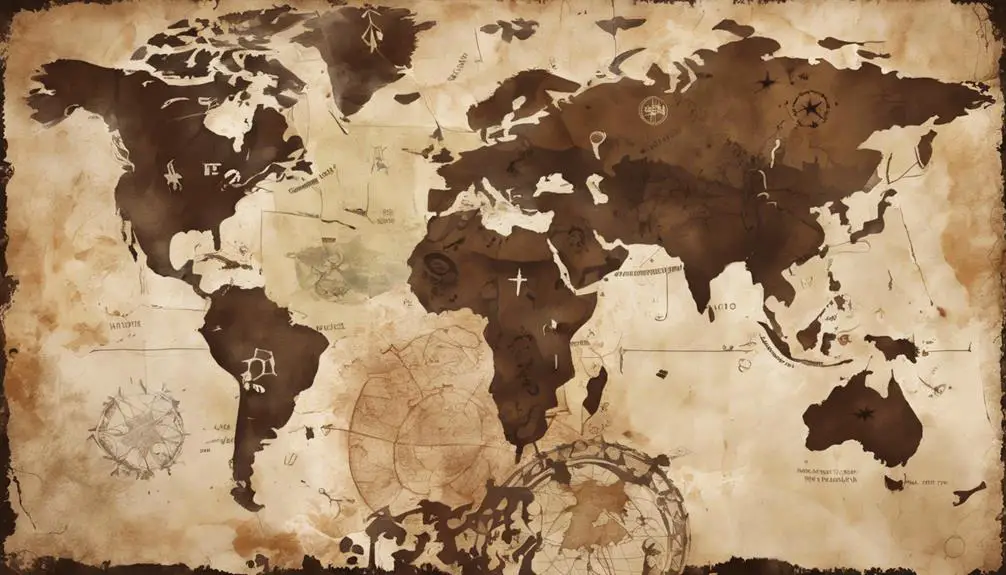
You're about to explore the fascinating world of military slang, and it all starts with understanding its roots. Military slang has its roots in the early 20th century, when soldiers, seeking to create a sense of community and shared experience, began inventing and adopting colloquialisms that distinguished them from civilians.
This etymological origin is rooted in the historical context of World War I, where soldiers needed a way to communicate quickly and efficiently on the battlefield.
As you investigate the historical context, you'll find that military slang was born out of necessity. Soldiers had to devise a language that was concise, clear, and quick to understand, often in life-or-death situations. This led to the creation of unique words, phrases, and abbreviations that were specific to the military community.
For instance, the term 'foxhole' originated from the trenches of World War I, where soldiers would dig holes for protection. By understanding the historical context and etymological origins of military slang, you'll gain a deeper appreciation for the language that has become an integral part of military culture.
From Trenches to Tweets
Fast-forward to the 21st century, and military slang has evolved to keep pace with technological advancements, seamlessly evolving from the trenches to the digital domain of social media, where abbreviations like 'OPSEC' (operational security) and 'FOB' (forward operating base) are now tweeted and posted alongside hashtags.
As you navigate the online landscape, you'll notice military personnel and veterans using social media platforms to connect, share, and communicate. This tech evolution hasn't only transformed the way military slang is disseminated but also amplified its social impact. Hashtags like #militarylife, #veteranlife, and #milso (military significant other) have become ubiquitous, allowing individuals to connect with others who share similar experiences.
You'll find that military slang has become an integral part of online discourse, with many service members and veterans using social media to raise awareness about issues affecting the military community.
This convergence of tech and military culture has far-reaching implications, enabling real-time communication and fostering a sense of community that transcends geographical boundaries. As you explore the world of military slang, you'll discover how this unique language has adapted to the digital age, embracing the power of social media to connect, educate, and inspire.
Slang of the Branches
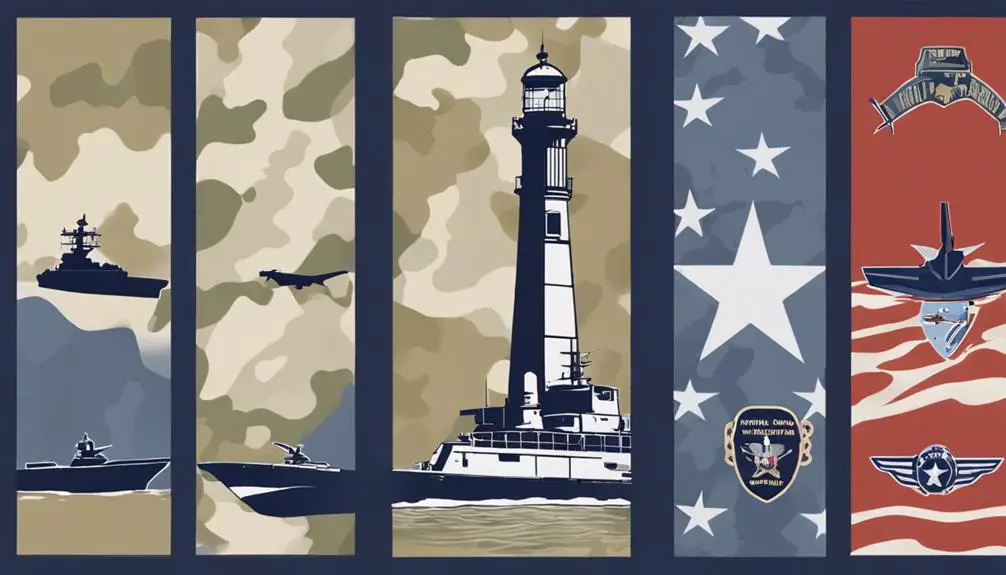
Each branch of the military has its unique slang, reflecting its distinct culture, history, and operational nuances. You'll find that the Army, Navy, Air Force, Marines, and Coast Guard each have their own distinct flavor of slang. This linguistic diversity is a result of the different environments, missions, and histories of each branch.
As you explore the slang of the branches, you'll encounter a range of colorful expressions that evoke the unique character of each service. For example:
- In the Navy, you'll hear 'deck ape' to describe a sailor who works on the ship's deck, or 'scuttlebutt' for gossip or rumors.
- In the Air Force, 'flight line' refers to the area where aircraft are serviced and prepared for flight, while 'dropping the bomb' means to reveal surprising or shocking news.
- In the Army, 'hooah' is a versatile expression that can mean anything from 'yes' to 'good job' to 'let's go!'
Code Names and Nicknames
Exploring deeper into the branch-specific slang, military personnel often use code names and nicknames to refer to people, places, and operations, adding another layer of complexity and intrigue to their linguistic arsenal. You might hear a commander referred to as 'Spartan' or an operation dubbed 'Operation Iron Fist.' These code names and nicknames serve as a way to obscure sensitive information, add a layer of security, and even boost morale.
Here are a few examples of code names and nicknames used in military operations:
| Operation Name | Nickname | Description |
|---|---|---|
| Operation Desert Storm | Operation Namesakes | Liberation of Kuwait |
| Operation Enduring Freedom | Operation Infinite Justice | War in Afghanistan |
| USS Nimitz | 'Old Salt' | Aircraft Carrier |
| F-16 Fighter Jet | 'Viper' | Multirole Fighter |
| General James Mattis | 'Mad Dog' | Former Marine Corps General |
These cryptic call signs and operation namesakes add to the mystique and intrigue of military communication. As you explore further into the world of military slang, you'll discover more examples of code names and nicknames that have become an integral part of military culture.
Battlefield Banter
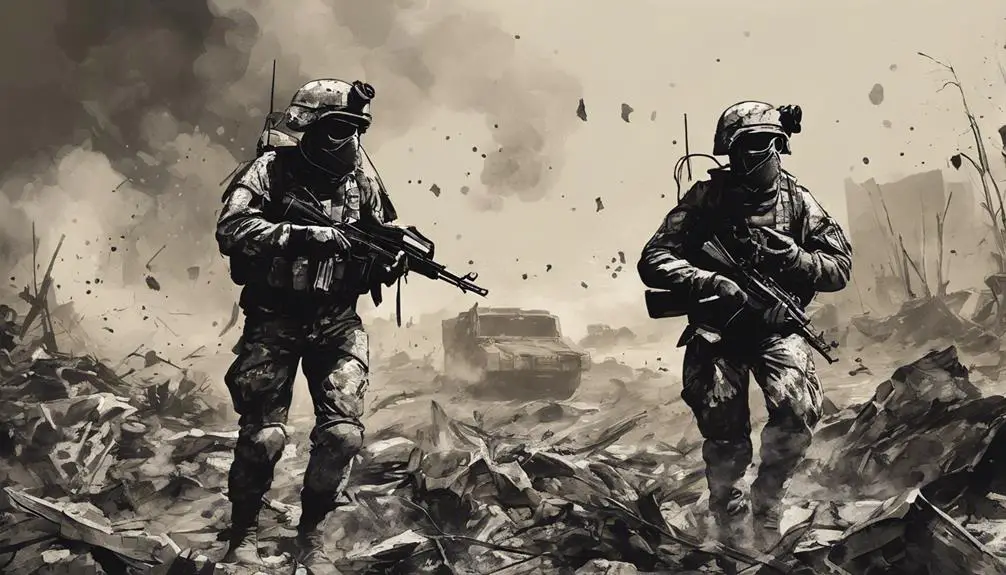
You've likely heard the phrase 'military humor' – a unique blend of dark humor, sarcasm, and irony that emerges in high-stress environments, and it's this kind of battlefield banter that helps soldiers cope with the psychological toll of war.
Combat humor is an essential component of battlefield banter, allowing soldiers to release tension and maintain morale in the face of adversity. It's not uncommon to hear war cries and sarcastic remarks exchanged between soldiers in the heat of battle. This type of humor serves as a coping mechanism, helping soldiers to momentarily forget about the dangers surrounding them.
Imagine the following scenarios:
** A soldier jokingly remarking, 'Well, at least we're getting some exercise in today!' while lugging heavy gear through the desert.
** A team leader yelling, 'Let's move out, ladies!' to motivate his squad during a tense patrol.
** A group of soldiers playfully arguing over who got the most sleep the night before a big operation.
These lighthearted moments may seem trivial, but they're critical in maintaining the mental resilience of soldiers in combat zones. By embracing combat humor and war cries, soldiers can momentarily escape the harsh realities of war and find solace in the camaraderie of their unit.
Military Myths Debunked
Six common misconceptions about the military are about to be shattered, and it's time to separate fact from fiction.
You've probably heard tales of Warrior Legends, but let's get real – they're often exaggerated or flat-out false. For instance, you might've been told that boot camp is all about brutal drill sergeants and endless push-ups. Not true. While it's tough, Boot Camp Rumors about sadistic instructors are largely myths. In reality, drill sergeants are trained to push you to your limits, but they're also mentors who want to see you succeed.
Another myth is that military personnel are all gung-ho, adrenaline-junkie types. Not so. Many service members are regular people who just want to serve their country. And no, you won't be forced to eat bugs or sleep in the mud (unless you're in a survival training exercise, that is).
The military isn't all about combat either – many roles involve supporting roles, like logistics or administration. By debunking these myths, you'll get a more accurate picture of what military life is really like.
Lost in Translation
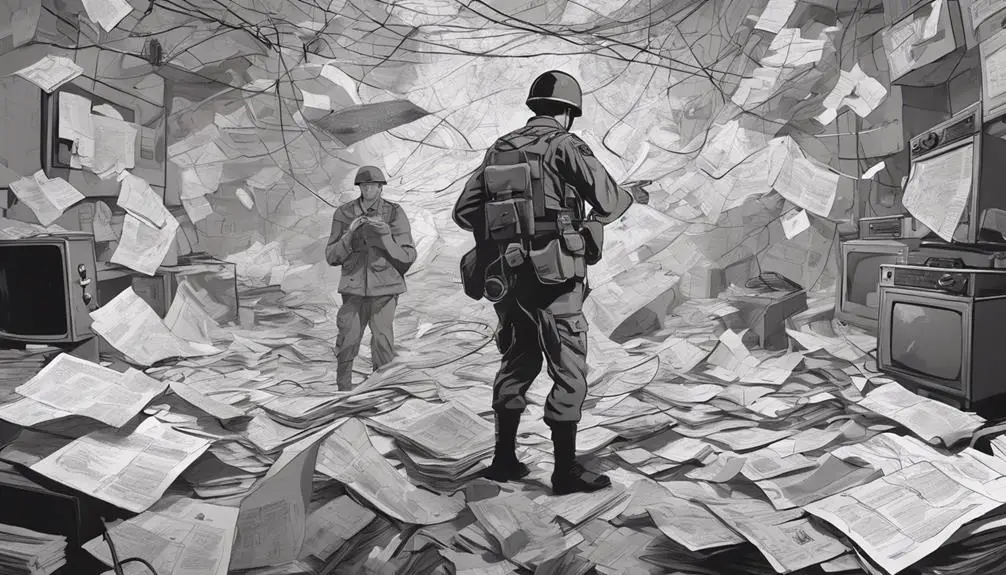
As you gain a clearer understanding of what military life is really like, you'll realize that communication is key, and that's where military slang comes in – a unique language that can be confusing to outsiders but is essential to those in the military. However, this specialized language can sometimes lead to cultural barriers and language gaps between military personnel and civilians.
For instance:
** Imagine being a military spouse trying to decipher what your partner means when they say 'I've got a debrief at 1400 hours' – it's a simple phrase, but it's lost on you.
Picture a veteran trying to explain their combat experience** to a civilian, but struggling to find the right words to convey the intensity of the situation.
Envision a new recruit feeling overwhelmed by the sheer amount of jargon and acronyms thrown their way during basic training**.
These scenarios highlight the importance of understanding military slang, not just for effective communication within the military, but also for bridging the gap between military and civilian life.
Frequently Asked Questions
What Is the Most Widely Used Military Slang Term of All Time?
You're curious about the most widely used military slang term of all time. To answer this, let's explore the world of slang evolution.
One term that stands out is 'Roger That.' This phrase, derived from radio communication, has had a significant term impact, becoming a universal expression of understanding.
Its widespread use transcends military branches, making it the most widely used military slang term of all time, with a lasting impact on popular culture.
Are Military Slang Terms Used More in Combat Zones or in Barracks?
You're wondering where military slang terms are used more – in combat zones or barracks. Surprisingly, it's not a clear-cut answer.
In combat zones, slang emerges from the need for quick, concise communication amidst high combat intensity.
Yet, in barracks, slang flourishes through casual banter, fostering camaraderie and relaxation.
You'll find both scenarios use slang, but for different purposes.
Can Military Slang Be Used in Formal Military Communications?
When it comes to formal military communications, you'll typically stick to formal language, adhering to official protocol. Military slang, colloquialisms, and informal expressions are generally avoided in written reports, official briefings, and formal announcements.
This guarantees clarity, precision, and professionalism in communication. While slang might be common in casual conversations, it's not suitable for formal military communications where accuracy and clarity are paramount.
Do All Military Branches Use the Same Slang Terms?
You're about to uncover a secret: not all military branches speak the same slang language. While some terms might overlap, Branch Variations exist.
The Army, Navy, Air Force, and Marines have their own unique slang, shaped by their distinct cultures and histories.
Slang Evolution occurs as new generations of servicemembers bring their own lingo to the table.
Are Military Slang Terms Only Used by Enlisted Personnel?
One intriguing point to note is that military slang terms aren't solely the domain of enlisted personnel. In fact, officers also incorporate slang into their communication, albeit in a more understated manner.
Officer culture tends to embrace more sophisticated, nuanced language, while enlisted troops frequently utilize more informal terms.
It's also noteworthy that civilian influence can play a role, as officers may incorporate slang from their civilian life or education.
Conclusion
As you navigate the complex world of military slang, you stumble upon a fascinating coincidence: the parallels between historic trench talk and modern tweet-speak.
It's as if the linguistic evolution of military slang has come full circle, from the trenches of World War I to the digital trenches of social media.
Coincidence or not, the lingo has adapted, and its cultural significance remains strong.
One thing is certain – military slang continues to shape our language, one deployment at a time.

